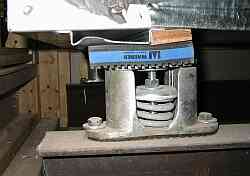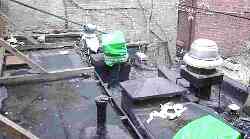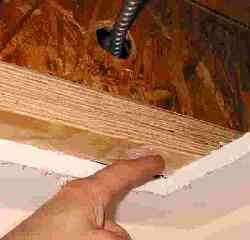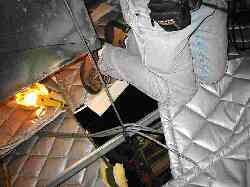|
News: Alan Fierstein gives lecture on Sound & Noise at the Air Conditioning Contractors' Association.

This combination of isolators was improperly used, rendering them ineffective. It is far cheaper to install the proper sound and vibration measures when equipment is first installed than to guess wrong and have to do the job over again.

This contractor tried everything he could to stop noise from exiting from these exhaust fans, with no success. We showed him how to do a good job for a low price.

We show contractors how to correct and avoid mistakes.

Climbing into a hung ceiling to inspect it isn't for the faint-hearted.
|
Smart builders know they will be liable if the promised soundproofing is not delivered, so they make sure the proper consultant is called in. Buyers of Co-Op and Condo units are more demanding of a quiet environment than ever before. A recent "noise nuisance" case was decided in favor of the condo unit owner, granting her a large abatement for excessively noisy roof equipment. Read More
In addition, the DEP now requires new or renovated units in Special Mixed-Use Districts to meet stringent noise guidelines. The Dept. of Buildings won't even issue a permit until the DEP determines that its requirements have been met. Read More
Contractors are frequently called upon to do renovations where there is some sound isolation or noise issue involved. Some of them may have a reasonable idea about some noise control methods but they lack the equipment and expertise to do the proper tests and analysis. For example, a contractor may have "soundproofed" another job across town and may think that another job could use the same treatment.
However, as every situation requires different corrective measures, without tests the methods chosen will not be ideally suited to the problem at hand. They may not achieve the desired results or be more expensive than was necessary, or both. For a fraction of the total cost of the job we can give you specific recommendations to achieve the client's objective. In many cases we end up saving the client more than our fee by specifying a cost-effective solution. It's a small price to pay for a client's peace of mind...and yours.
Noise Control Test, Decibel Testing, Building Department TR-1 Controlled Inspection for Noise
The City often requires Noise Control Tests (also called Decibel Tests or Noise Tests) before builders can get plans signed off for a Certificate of Occupancy (C of O). Noise Testing may be required for a renovation, an air conditioner or exhaust fan installation, or for floor and wall alterations. Co-op and condo boards have their own rules and they are becoming increasingly aware of noise problems. Landlords frequently write soundproofing requirements into commercial leases. We can perform the standard tests for Impact Noise (INR / IIC) and Airborne Noise (STC) transmission and give recommendations to head off problems in the planning stage.
The City Department of Environmental Protection is currently requiring
stringent window and wall construction in certain E Designation
districts that have noisy environments. This is described in NYC Zoning
Resolution 123-32.
We have recently worked successfully with DEP to relax these
requirements by demonstrating that a particular site was not as noisy
as previously assumed. By carefully measuring the noise and performing the necessary
analysis in conjunction with the DEP staff, we have been able to save our clients hundreds of thousands of
dollars in building costs.
We can start the process promptly and expedite your project.
Renovations & Noise Control Testing
For certain kinds of new construction and renovation, the DEP will require Noise Control Tests (also called Decibel Tests or Noise Tests). Co-op and condo boards have their own rules and they are becoming increasingly aware of noise problems. Noise Testing may be required for a renovation plan to be approved. We can perform the standard tests for Impact Noise (FIIC) and Airborne Noise (FSTC) transmission and give recommendations to head off problems in the planning stage, rather than after the construction is done.
Please visit our Client List page for to see some of the Contractors and Builders we have worked with.
|
 ®
®



